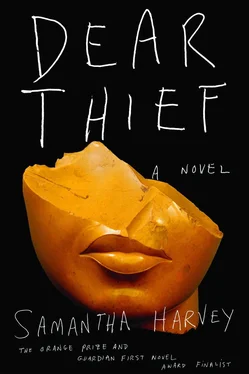I won’t write any more, Butterfly, once he is back. The pen seems to fall dead at the idea of going on. The nib has split further and it has developed a creak; every time I pick it up nowadays I feel like I am sending an old man back to war.
But then there is always one more thing.
Do you remember the game we used to play, called Chair? It’s strange how I thought of it only tonight, and not back when I wrote about the chair in the Pinter play; it hadn’t occurred to me then at all, perhaps because I had been thinking more of your absence than your presence back then. In any case, we would put a chair in the middle of the room, the big red room at my parents’ house, and one of us would stand five paces in front of it with our eyes closed, then wait silently for a minute. The room was often very dark. The object of the game was to judge whether the other was sitting in the chair at the end of the minute. It was a question of honour that the one with her eyes closed should be able to sense the movement of the other, should be able to know when the chair was available to sit in. We did not make it easy for the other, we learnt to move silently and misleadingly.
I don’t know how you remember this game, but for me it is always with some excitement and apprehension, and also fear. To know there is another person in the room and to not know where they are, but to try to sense them, as subterranean animals must. If we felt that the other person was not in the chair we would take five paces and sit in it ourselves, but to get it wrong, to sit when the other was already there, was a kind of transgression — we would not screech or collapse in laughter, but would flinch as if burgled. It was a betrayal to share space, to blunder into the other’s space; if we really knew one another, loved and understood one another, we would not. It is only when I think of it now that I can see the peculiar premise of that game, that intimacy is a form of distance, that you become sharply aware of the other’s existence only in order to avoid it.
Maybe it has given me a kind of paranoia to not know, for so many years, where you are. That and a sense of failure, yes — paranoia and failure. If I don’t know where you are, perhaps I will never see you again, or perhaps I will turn round and you will be there, and I am never quite sure which is worse. Sometimes I have felt you near, or have mistakenly thought you were there, as I did that day clearing the snow. Other times you leave me so clueless and empty of instinct that I have to resort to random imaginings that I know are wild and far-fetched. And then for a moment or two they do not feel even remotely far-fetched enough.
Teddy did send me a photograph from Lithuania, in case it interests you. It was back in February, in fact I think a few days before the Pinter play, a few days or a week, but I didn’t want to tell you because I didn’t want to share Teddy with you, if I am giving you the truth. It was not a photograph he had taken himself but one found in a shop of old Lithuanian ephemera — a black-and-white aerial picture of men, women and children standing in a line of joined hands along an empty road flanked by woods. The 1989 Baltic Chain, as you will know. It made me cry with some old reserve of hope. I counted them. They were twenty-one of two million people joined hand-to-hand through three countries to protest against their occupation, twenty-one of two million; four million hands, joined. I became overwhelmed by the thought for a little while. We are joined. ‘Naima’ sounds to my ears like ‘Ruby, My Dear’, then (in the way a silver fish jumps out of the water and flashes purple) I hear something of ‘Sinnerman’, then the voices of worried praise, then of gospel. There is no way the things of this world can isolate themselves or be isolated. We encroach on one another, be it painfully or pleasurably, we encroach and run into each other, and this is what we know fondly or otherwise as life. It is not life to think that to love somebody is never to be where they are and never to intrude upon them.
I am really not sure now which of us invented the game of Chair, I always assumed you, but I have been led to wonder. In any event it was you who proved later in life its complete unworkability as a strategy. I took five paces and found you in my seat, and I could not dislodge you, you would not go. But maybe I have learnt, or I am learning through writing this, to be glad of your many trespasses. Even theft is a form of connection after all, and I do not mean this flippantly; to be encroached upon is in itself to be reminded of your own position amongst things. To be touched by the hand that stole from you or pushed you aside. I have tried lately not to isolate myself, to strike up friendships however loose, random or mismatched, odd little bonds formed over sardines or religion or cards or regret, and these bonds for the most part, to my own amazement, have outlived their starting points.
It is half past three in the morning now and Nicolas will be here soon, and I have to be at work in two hours. A woman is not born to toil , I have been thinking, somewhat repetitively. While making tea and worrying about lack of sleep I suddenly remembered this absurd notion of Kierkegaard’s, passed on to me once by my grandmother: A woman is not born to toil; if she wants to move towards infinity, she has to travel along the gentle path of the heart and imagination.
I really do not know what kind of blessed lives my grandmother and Kierkegaard had, to make them think the path of the heart and imagination is gentle . It is like walking on nails. It is like walking on nails having first been set on fire. With your hands tied up your back in forced prayer. And a stake through your throat. A dagger in your back. What I mean to say is that this path we are trying to chart is not an easy one and I forgive you simply because I hope to be forgiven; I know it is not your way, but if I were you I would take forgiveness, even if it is only mine, and even if it belittles you.
The fact being — though I was not going to write it — that I think I saw you. I don’t know if it was you, but until I can verify it I will have to assume it was. I saw the back of you walk down the street past Jimmie’s and up towards Guilford Street, the way I would go if I were dropping in on Yannis, walking quickly in the rain with your head down, in a long raincoat and high heels, your feet not so much touching down on the pavement as piercing it and pushing it back behind you. Your familiar purposeful, long-legged walk.
But let me go back a moment so you know why I thought it was you, as opposed to any number of other women in this enormous town. It was lateish last night, around eleven, and I was in the living room, sorting through the pile of mail that had accumulated downstairs in the hall; post is one of the problems with living communally, there is so much of it and most of it is junk. But if you throw the lot away you might throw out something important, that was missed, something from Teddy, for example. This was part of my tidying frenzy before Nicolas coming back, and a strange and irrelevant one because it isn’t even the kind of thing he would notice. I had the post in a pile on the floor and was sifting through, trying I suppose to wind myself down to sleep so that I could get up at five-thirty a.m. for an early shift.
So I was sifting through. I was tired. I’d had a few glasses of wine at Yannis’ just before that, as you know. The window was open and it was raining, but not much. Then I heard voices on the street below my window, voices of a man and woman standing there, not walking past — nothing unusual in this, at night there is always the routine emptying-out of bars and the talk and the singing, which I go to sleep to — ever the lover of people, I sleep badly when they are not there. I think you never did understand that. People were to you a kind of beautiful problem. You needed their approval, and you disapproved of yourself when you did not get it, and disapproved of yourself even more when you did, as if you had done nothing to earn it.
Читать дальше












